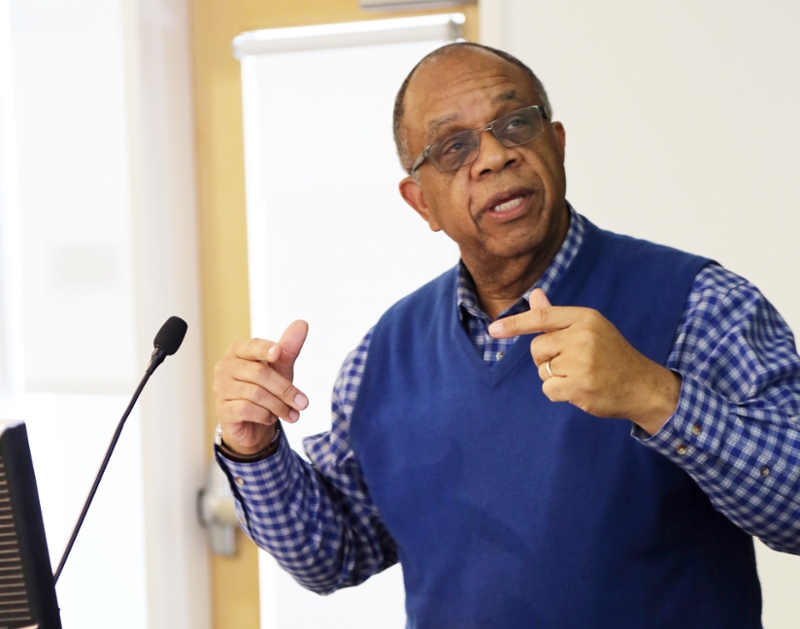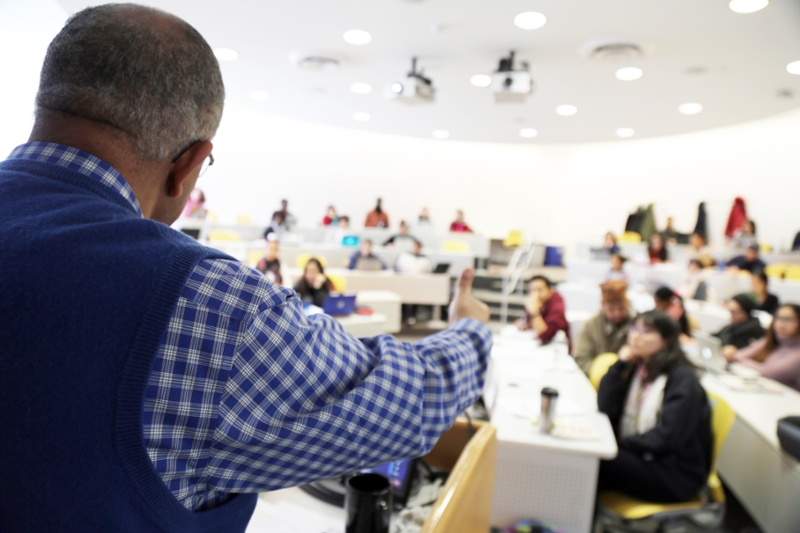By Lauren Gibbons Paul

It’s nearly 2 o’clock on a Thursday afternoon in Heller’s Shonkoff Amphitheater. Four large pizzas (one halal) are stacked up on the desk at the front of the hall. Forty-four students in the popular mediation seminar, part of the Conflict Resolution and Coexistence (COEX) masters program, chat and eat as they wait.
The COEX program is among the most diverse at Heller, with this year’s cohort of 37 students representing 23 countries—many of them hailing from active conflict zones in the Middle East, Sub-Saharan Africa and elsewhere. The students are soon joined by associate professor Ted Johnson, who will lead a lecture and discussion on navigating difficult emotions in mediation before the class breaks into smaller groups for a mediation simulation.
What cuts across the students’ surface differences: a drive to be heard, to participate and to win approval from the professor they so obviously adore. Though the role of the mediator is to occupy and assist in the space between parties and their adversarial positions—rather than advocating for any individual or viewpoint—it is clear everyone wants the genial Johnson on their side.
Emotions often run high in mediation sessions, says Johnson. Though the atmosphere can be uncomfortable, the job of the mediator is not to smooth over the hurt feelings and make everyone feel better, “but to acknowledge the positions and discomfort that often leads to suboptimal responses.” Johnson reminds students that helping to manage the inter-personal dynamics of a dispute are an essential skill needed by effective mediators. In that type of situation, the mediator’s aim should be to keep the dialogue flowing and to help build trust among the parties. Reading the dynamics of the mediation space and helping to guide the parties toward mutually acceptable outcomes are important, says Johnson. “One well-crafted question can frequently change the dynamic.”
The Power of Asking
To see this principle in action, the class watches part of a video called “The Color of Fear” that shows a mediation session between men of different races. In one clip, a black man named Victor says to David, a white man: “There’s a way in which ‘American’ and ‘white’ and ‘human’ become synonyms. It troubles me when you say: ‘Why can’t we just treat each other as human beings?’ To me, when I hear it from a white person that means, ‘Why can’t we all just pretend to be white people?’” laments Victor. He points out that his skin, his hair and his voice mean that he can’t just pretend to be white, even if he wanted to.
Later in the video, David tells Victor that his attitude limits him. “Did it ever occur to you you’re going in the wrong direction?” he says. Victor’s frustration mounts visibly. The mediator, the acclaimed Lee Mun Wah, quietly asks the white man a simple question: “What is keeping you from believing what Victor says?” This question changed the whole dynamic when David admitted that he really didn’t know that Victor’s world was that harsh. As a result of this brief exchange, two men from different perspectives came closer to understanding each other, and their worldviews began to change.
“Questions can be more powerful than statements,” says Johnson. As in the video, when a tense negotiation triggers an “identityquake” for one of the parties—an event that rocks that person to the core—the mediator’s job is to help the parties find balance in the moment and, ideally, help them break through the impasse.
True to his background as a master mediator, Johnson’s pedagogical style is much more to query than pontificate. He feels best, he says, when his students are vocal and engaged. In a characteristic exchange Johnson asks, “What is a ‘win’ for a mediator?” Responses come fast from around the classroom, many hands in the air.
“It’s helping two parties have a conversation they could not have had on their own.”
“It’s helping to reframe the debate.”
“It’s about creating a safe space where the mediation can take place.”
“It’s not saying something that makes things worse.”
Finally, someone says it’s about getting a “win-win” for both parties. Johnson’s eyes light up. “Thank you for sharing that,” he says. “Must this be a zero-sum game? Is there any reason both parties can’t win?” The mutual gains of both sides are paramount, he says. “Successful mediation is about helping the parties see where their common interests lie.”
With a background in international mediation between foreign states, Johnson seems the perfect person to help these budding mediators, many of whom aim to work for governments abroad. Certainly, there is no lack of ambition among these students, who bring unique personal histories and perspectives to every question.
Johnson guides the students through the shifts that great mediators hope to enable during a session. “Changing your thoughts from certainty to curiosity can lead to breakthroughs,” he says. The other key shifts espoused by Wah and others are from “material to spiritual” and “solution to transformation.” Standing with the parties as a communicator and “midwife” for social change, the mediator should strive to be patient, observant, and facilitate part of what can be a natural process says Johnson.

Trying Out New Skills
The students put those principles to the test during small-group mediation simulations that afternoon. The exercise involves a real South African case study in which homeless squatters were occupying a school building at night. Each five-person mediation group had prepared roles to play: Two squatters (who had nowhere else to go), two town councilors (who wanted the squatters evicted) and one mediator. The inherent difficulty with the mediation: The vastly unequal bargaining power of the squatters, who were largely at the mercy of the councilors and police.
And yet, the students make the case that they brought value to the community by working for the residents in jobs such as housecleaning and childcare and that they were owed something in return as long as the school property was not damaged. In the real life case, however, legal action was necessary. The judges who ruled in the Zulu case in South Africa wrote that housing was a basic human right and squatters could not be removed without a court order.
The students on all sides of the mediation exercises were respectful even while arguing forcefully, and those charged with playing the role of mediator were appropriately neutral. As the students had seen firsthand that afternoon, it is very difficult to stay cool-headed as a mediator when one side seems clearly wrong – whether that be due to racism (in the case of the video clip) or uncompassionate (in the case of the squatters).
Choosing Tolerance
“Remember that each worldview is valid to the one who holds it,” cautions Johnson. This sentiment is all the more pressing in today’s bitterly divided political climate. As the name of the program underlines, living in coexistence with others who are different and who hold diverse beliefs is one key goal of the COEX program. For Johnson, it starts with a mindset.
"Coexistence is a matter of personal orientation. I’ve always seen myself as a collaborator. I’ve had experiences that have caused me to believe that coexistence is actually a lifestyle,” says Johnson. To counter the Trump administration’s “extreme vetting” of immigrants, Johnson proposes practicing “extreme compassion,” which applies to all, including the president.
Though Johnson is a lawyer by training, at heart he is a mediator, not an advocate. “As mediator, your role is to facilitate understanding. You want to reach a point where people are willing to share with you the things that are important to them,” he says. Everyone starts a negotiation with a position. The trick is to get underneath the positions, find core interests and identify where commonality may lie.
While lawyers fight for their clients to win and their opponents to lose, “Mediation is a different animal,” says Johnson. What’s missing in the “win at all costs” attitude is the concept of relationships. “If you beat them, the next time you negotiate they will be looking to beat you. Then you have a war. The problem with personal wars is that they intensify each time the parties interact.”
Reducing interactions to winning and losing is antithetical to coexistence, says Johnson. “Eventually, every war comes to an end, not necessarily because we beat the other side into submission, but sometimes because it was simply not sustainable to continue the battle.”
Johnson enjoys teaching mediation to Heller students who come from every conceivable culture and background. The exercise is much more about unpacking culture than solving problems, and he likes it that way. Over a decade of teaching at Heller, Johnson has learned not to expect results overnight – he jokes that teaching is like watching grass grow. “You don’t always know where the seeds are going to take root, but sooner or later they do grow.”
